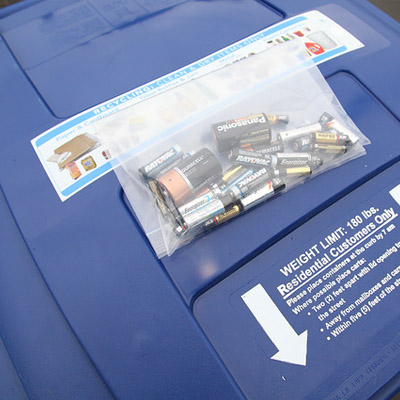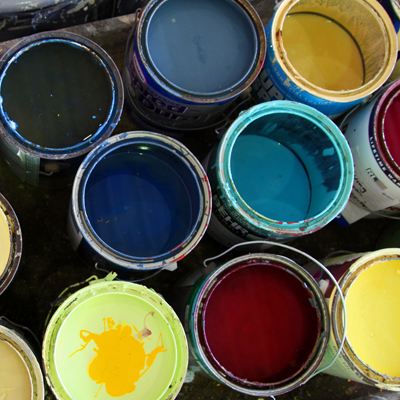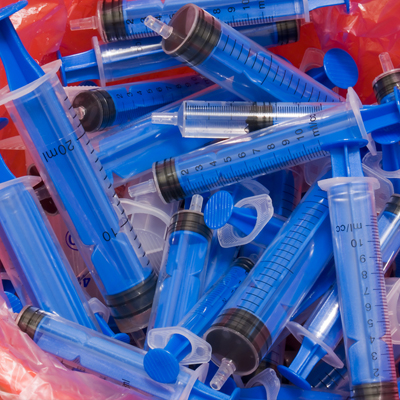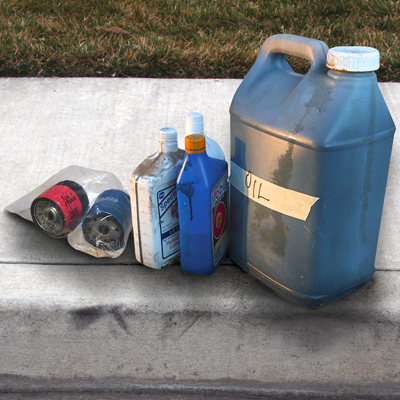Hazardous waste accounts for significant amounts of toxic waste in landfills. Items such as electronics, fluorescent bulbs and tubes, paints, pesticides, cleaning products, old medications and other chemicals are illegal to put in the garbage or pour down a drain or gutter because they contaminate our soil, drinking water and air.
- AUTO BATTERIES
- MEDICATIONS
- PAINT
- SHARPS
- MOTOR OIL/FILTERS
AUTO BATTERIES

All Recology Eel River recycling centers will pay you to recycle your automotive batteries.
DROP OFF
Drop off your appliances at the following locations (fees apply):
Recycling today’s conventional 12-Volt lead-acid starter batteries, the ones used in almost every single one of the 70 million or so motor vehicles built globally each year. Turns out that the 12-Volt battery is the most recycled product in the world, according to the U.S. Environmental Protection Agency. In the U.S. alone, about 100 million auto batteries a year are replaced, and 99 percent of them are turned in for recycling.
Roughly 97 percent of the lead in a 12-Volt battery can be recycled. The electrolyte, especially sulfuric acid, can be neutralized, repurposed, or converted into sodium sulfate and used in fertilizers or dyes. Even the plastic case can be ground up and reused.
MEDICATIONS

When medications are disposed of in the trash or down the drain, they can end up in the wrong hands, or in our soils and waterways. Waste water treatment facilities are not properly equipped to remove medicinal substances from the water. The result? A wide range of pharmaceuticals have been found in our rivers and lakes.
Drop Off
Drop-off locations are available throughout Humboldt County. Please see the County’s HHW page or click here.
PAINT

- The Fortuna Transfer Station and the Redway Transfer Station are all part of the PaintCare Stewardship Program.
PaintCare currently operates paint stewardship programs on behalf of paint manufacturers in states with paint stewardship laws. Recycle your paint for free!
You can recycle paint free of charge during regular business hours.
SHARPS

Residents with medical conditions requiring the use of hypodermic needles are required to arrange for proper disposal. California law prohibits the disposal of “sharps waste” in trash or recycling containers.
Home generated sharps waste includes: Hypodermic needles, pen needles, syringes, lancets, and other devices that are used to penetrate the skin for medical purposes.
Humboldt County residents have one of the best programs in the nation to safely dispose of their used syringes, needles and lancets: the Safe Needle Disposal Program.
Sharps Disposal Policy:
- Do Not Place Sharps in the Recycling Container or Trash
- Sharps are not plastic to be recycled even if you take the needle off.
- All Sharps must be placed in a Sharps Disposal Container and taken to one of the proper disposal sites.
DROP OFF
Sharps Containers may be dropped off free of charge at:
- Fortuna Transfer Station
- Humboldt Sanitation, 2585 Central Avenue, McKinleyville
- Eureka Community Recycling, 1059 West Hawthorne Street, Eureka
MOTOR OIL & FILTERS

Oil keeps our cars, lawnmowers, and many other machines running smoothly. But, once oil is used, it must be discarded properly, to keep it from contaminating the environment. Recycling used oil is becoming the preferred way of handling used oil to protect the environment and conserve natural resources.
Used oils such as engine lubrication oil, hydraulic fluids, and gear oils used in cars, bikes, or lawnmowers can pollute the environment if it is not disposed of properly.
DROP OFF
Bring your used oil and filters to a facility below and we can recycle your used oil and filters for a small handling fee. Please place oils in a leak-proof can or container.
Just the Facts
Two hundred million gallons of used oil are improperly disposed of each year. Recycling just 2 gallons of used oil can generate enough electricity to run the average household for almost 24 hours. (Source: American Petroleum Institute). It takes 42 gallons of crude oil, but only 1 gallon of used oil, to produce 2.5 quarts of new, high-quality lubricating oil.
Recycling Used Oil and Oil Filters
Used oil can be re-refined into lubricants, processed into fuel oils, and used as raw materials for the refining and petrochemical industries. Used oil filters contain reusable scrap metal, which steel producers can use as scrap feed.
To recycle used oil, processors and refiners remove water, insolubles, dirt, heavy metals, nitrogen, chlorine, and oxygenated compounds from oil drained from automobiles or other machines. The resulting product—called “re-refined” oil—must meet the same stringent refining, compounding, and performance standards as virgin oil for use in automotive, heavy-duty diesel, and other internal combustion engines, and hydraulic fluids and gear oils. Extensive laboratory testing and field studies conclude that re-refined oil is equivalent to virgin oil—it passes all prescribed tests and, in some situations, even outperforms virgin oil.
The same consumers and businesses that use regular oil also can use re-refined oil, since re-refining simply reconditions used oil into new, high-quality lubricating oil. Any vehicle maintenance facilities, automobile owners, and other machinery maintenance operations that use oil also can use re-refined oil. In some cases, fleet maintenance facilities that use large volumes of oil arrange to reuse the same oil that they send to be re-refined—a true closed recycling loop.
Benefits of Recycling Oil
Recycling used oil keeps it from polluting soil and water.
Motor oil does not wear out—it just gets dirty—so recycling it saves a valuable resource. Less energy is required to produce a gallon of rerefined base stock than a base stock from crude oil.